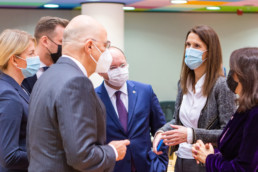On Monday 24 January, the Deputy Prime Minister and Minister of Foreign Affairs, Sophie Wilmès, and her European counterparts came together for a meeting of the General Affairs Council (GAC) in Brussels.
The security situation in Europe
Given the situation on the Ukrainian border, the Council adopted new resolutions concerning the European security situation. These resolutions condemn Russia’s attitude and call for de-escalation, while reiterating the full commitment of the Council members to the fundamental principles of European security. A comprehensive set of sanctions is being finalised at the EU level and could be implemented very quickly, if necessary.
Sophie Wilmès: “Together, the European foreign ministers are sending a strong message of unity today. Russia’s aggression is unacceptable and the price to be paid if Ukraine were to be attacked will be heavy. There are also fundamentals which cannot be subject to change: borders cannot be violated, countries are sovereign in their decisions and the non-recognition of the concept of “spheres of influence”. Accordingly, Russia is called upon to commit itself to immediate de-escalation and choose the path of dialogue in international fora.”
Belgium embraces the large financial support programme announced by the European Commission this afternoon.
After exchanging views with regard to security in Europe, the Foreign Ministers met, by videoconference, with their American counterpart, Mr Antony Blinken. Among other things, the latter reported upon his visit to Ukraine as well as the meeting last Friday with his Russian counterpart, Mr Sergey Lavrov, in Geneva. He had the opportunity to elaborate upon the American vision for the way forward concerning this issue.
Through its Deputy Prime Minister, Belgium thanks the United States for the efforts which it has undertaken to consult the European Union and its member states conscientiously and thoroughly with regard to this issue, which directly concerns security in Europe. Sophie Wilmès: “Belgium is satisfied with the close cooperation and the excellent exchange of information with the Americans. We cannot afford to underestimate the importance of having a common approach here, in a multilateral framework; but also with regard to the “sanctions” component in order to create the most consistent deterrent effect possible. Unilateral announcements and decisions will lead to us being misrepresented. Moving forward together is an imperative at absolutely every level.”
Mali
The announcement by the Malian transitional authorities to extend this transitional period (period without elections) to five years and the confirmation of the presence of the private Russian-based Wagner militia have raised a lot of concerns among European ministers.
Sophie Wilmès: “The announcement of the choice of the transitional authorities to postpone the elections is a disastrous signal that Mali is moving away from stabilisation and democratisation.” A visit by the Malian Minister Diop to see the High Representative Borrell is scheduled in Brussels on Wednesday. “We expect specific commitments and a positive agenda. Otherwise, the adoption of European sanctions is inevitable. These developments in Mali, in addition to the news from Burkina Faso, justify the high priority given by the European Union with regard to the situation in the Sahel in general.”
The Council discussion was preceded by a working meeting with the High Representative, Borrell, and some of the countries concerned, including Belgium.
Syria
The Council also discussed the situation in Syria, particularly in light of the recent attacks by “sleeper cells” of the Islamic State upon the al-Sina’a prison in Hassakeh in recent days. Sophie Wilmès: “We are very concerned about the deterioration of the security situation in the camps and detention centres in North-East Syria. The role of the Coalition against Daesh remains essential because the fight does not end with the fall of the self-proclaimed Caliphate.”
Ministers had the opportunity to exchange views with the UN Special Envoy for Syria, Mr Geir Pedersen, who explained the situation and his “step for step” approach, i.e. a series of steps aimed at launching a process aimed at overcoming the political impasse.
“Our country supports Mr Pedersen’s approach, which agrees that the Damascus regime must take the first step. The exchanges with Mr Pedersen were also an opportunity to reaffirm the fundamental principles of our policy towards Syria, starting with the refusal of normalisation towards the Damascus regime without a political solution in line with UN Security Council Resolution 2254. We will continue to support the civilian population with humanitarian aid. Contributions to the reconstruction of the country will only be possible if the regime undertakes a credible political transition involving all components of the Syrian nation,” Sophie Wilmès declared.
